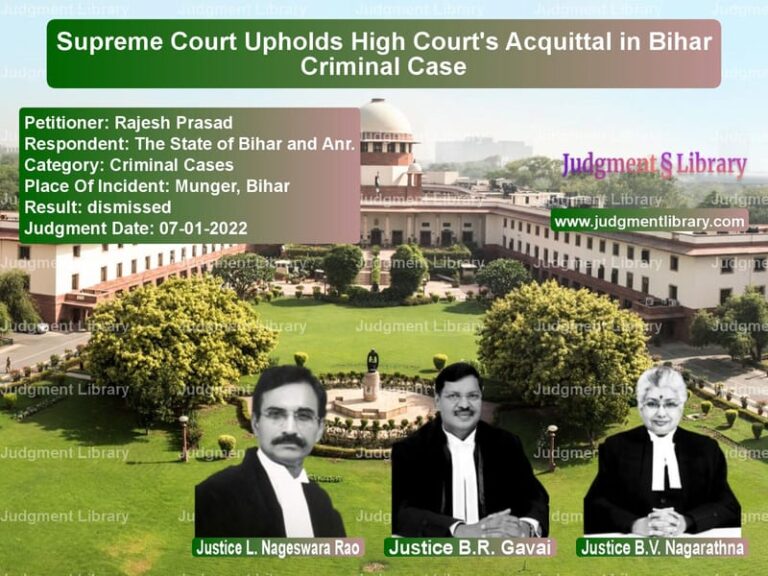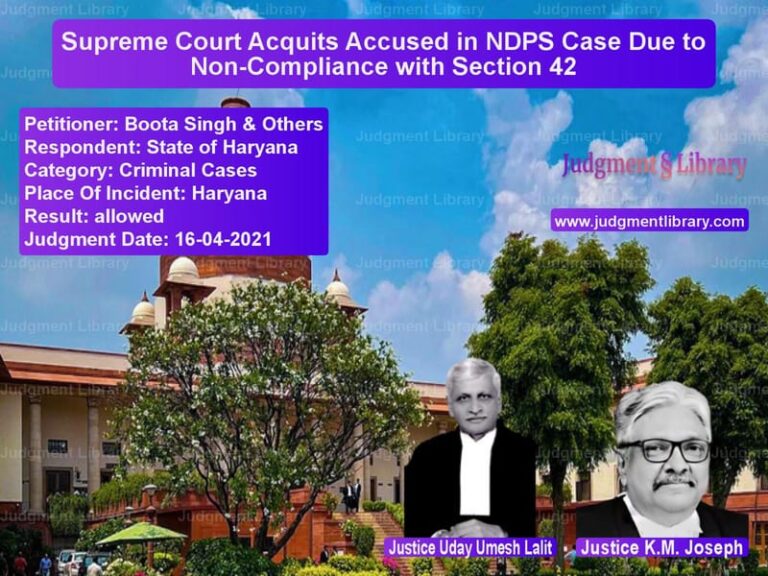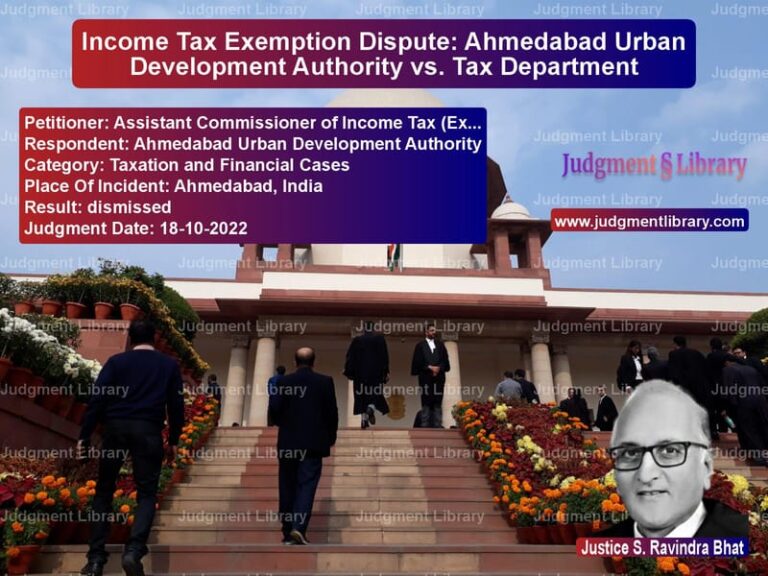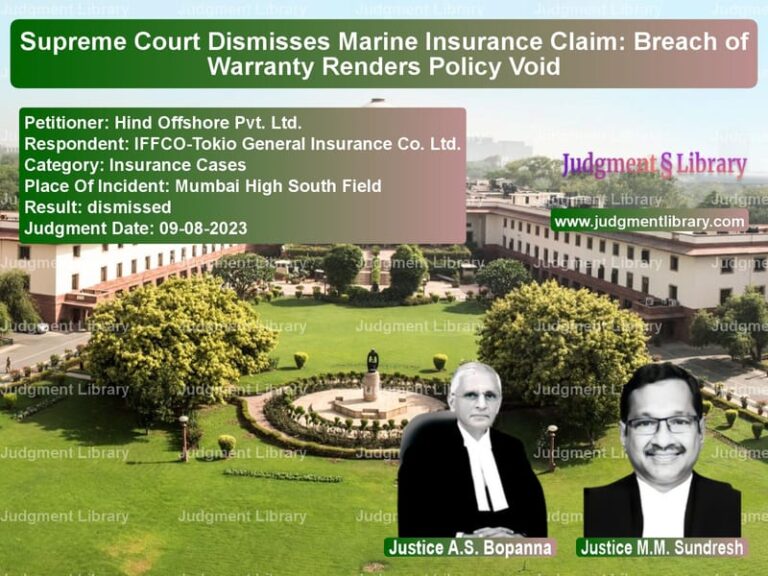Stamp Duty on Sale Agreements: Supreme Court Rules on Document Registration Requirements
The case of Shyamsundar Radheshyam Agrawal & Anr. vs. Pushpabai Nilkanth Patil & Ors. revolved around the issue of whether agreements for sale executed prior to the final sale deed required stamp duty and registration under the Maharashtra Stamp Act, 1958. The Supreme Court upheld the lower courts’ rulings, affirming that the agreements to sell, which included clauses on the transfer of possession, must be treated as conveyances and were subject to stamp duty.
Background of the Case
The appellants had filed a civil suit in 2008 seeking a declaration and injunction concerning two properties:
- Survey No. 165/4 – 2,550 sq. meters
- Survey No. 208/3 & 208/4 – 860 sq. meters & 5,650 sq. meters
During the proceedings, Defendant No. 46 moved an application under Sections 33, 34, and 37 of the Maharashtra Stamp Act, 1958, along with Section 17 of the Registration Act, requesting that six agreements for sale be impounded and registered as they included possession transfer clauses. The trial court allowed the application, directing the documents to be sent to the Collector of Stamps for adjudication of duty and penalties. This was upheld by the Bombay High Court, leading to the appeal before the Supreme Court.
Key Legal Issues
- Do sale agreements containing possession transfer clauses require stamp duty under the Maharashtra Stamp Act?
- Can prior sale agreements merge into the final sale deed, thereby negating the need for separate stamp duty?
- Does Explanation I of Article 25 of the Maharashtra Stamp Act apply in such cases?
Arguments by the Appellants
The appellants contended that:
- Since the final sale deed had already been executed and registered with full stamp duty paid, the prior agreements should not require additional stamp duty.
- Section 4 of the Maharashtra Stamp Act allows multiple documents in a transaction to be treated as a single instrument, with only the principal document requiring full stamp duty.
- One of the agreements was executed in favor of Mira Bhayandar Municipal Corporation, exempting it from additional stamp duty.
- The impounding order was misinterpretation of law as the agreements for sale were merely preparatory documents.
Arguments by the Respondents
The respondents countered that:
- The agreements clearly included clauses transferring possession, which makes them conveyances as per Explanation I of Article 25 of the Maharashtra Stamp Act.
- The agreements were executed between different parties at different times, making them independent transactions requiring stamp duty.
- The final sale deed does not invalidate prior agreements which transferred possessory rights.
Supreme Court’s Observations
1. Stamp Duty is Levied on the Instrument, Not the Transaction
The Supreme Court clarified that stamp duty is charged on an instrument, not the overall transaction:
“The duty is levied on the instrument and not on the transaction itself. Agreements to sell that include possession transfer must be treated as conveyances for stamp duty purposes.”
2. Agreements With Possession Transfer Are Conveyances
The Court referenced Explanation I to Article 25 of the Maharashtra Stamp Act, stating:
“Where an agreement to sell an immovable property includes a possession transfer clause, it shall be deemed to be a conveyance and attract appropriate stamp duty.”
3. Multiple Agreements Do Not Merge Into One
The Court rejected the argument that prior agreements automatically merged into the final sale deed, observing:
“The agreements were executed between different vendors and purchasers at different times, indicating independent transactions requiring separate stamp duty.”
4. Role of Section 4 of Maharashtra Stamp Act
The appellants’ reliance on Section 4, which allows multiple documents in a single transaction to be treated as a principal document, was dismissed:
“Section 4 applies only when all instruments form part of a single transaction. Here, the agreements were independent and executed in different periods.”
5. Collector’s Authority to Impose Penalty
The Court upheld the trial court’s direction to send the documents to the Collector for stamp duty adjudication:
“The Collector shall determine the stamp duty payable and impose penalties as per statutory provisions.”
Final Judgment
The Supreme Court dismissed the appeal, upholding the impounding of the documents and the requirement for stamp duty payment:
“The appeal is devoid of merit and stands dismissed. The agreements must be duly stamped and registered as conveyances under Article 25 of the Maharashtra Stamp Act.”
Impact of the Judgment
The ruling has significant implications for real estate transactions:
- All agreements for sale that include possession transfer must be treated as conveyances and attract stamp duty.
- Final sale deeds do not automatically nullify prior agreements if possession has been transferred earlier.
- Stamp duty must be paid on each conveyance instrument unless multiple documents explicitly form a single transaction.
- Failure to register such agreements can lead to penalties and legal consequences.
This judgment provides clarity on the application of stamp duty laws and prevents attempts to evade duty through pre-executed sale agreements.
Petitioner Name: Shyamsundar Radheshyam Agrawal & Anr..Respondent Name: Pushpabai Nilkanth Patil & Ors..Judgment By: Justice Pankaj Mithal, Justice R. Mahadevan.Place Of Incident: Thane, Maharashtra.Judgment Date: 24-09-2024.
Don’t miss out on the full details! Download the complete judgment in PDF format below and gain valuable insights instantly!
Download Judgment: shyamsundar-radheshy-vs-pushpabai-nilkanth-p-supreme-court-of-india-judgment-dated-24-09-2024.pdf
Directly Download Judgment: Directly download this Judgment
See all petitions in Property Disputes
See all petitions in Contract Disputes
See all petitions in Damages and Compensation
See all petitions in Judgment by Pankaj Mithal
See all petitions in Judgment by R. Mahadevan
See all petitions in dismissed
See all petitions in supreme court of India judgments September 2024
See all petitions in 2024 judgments
See all posts in Civil Cases Category
See all allowed petitions in Civil Cases Category
See all Dismissed petitions in Civil Cases Category
See all partially allowed petitions in Civil Cases Category







